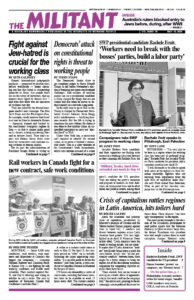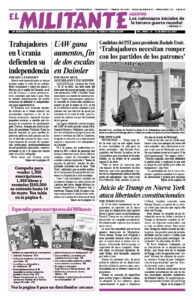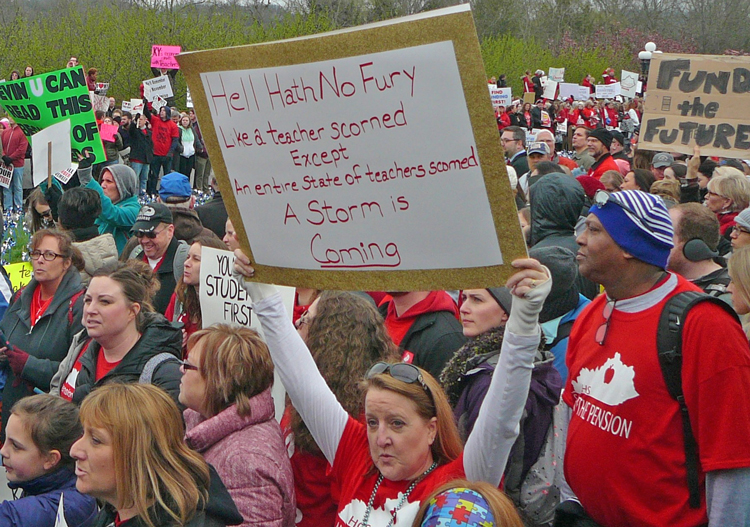The French edition of In Defense of the US Working Class by Mary-Alice Waters is one of Pathfinder’s Books of the Month for May. It features the talk Waters gave at an April 24-26, 2018, international conference in Havana organized by the Cuban Institute of History and the Central Organization of Cuban Workers (CTC). Waters is a member of the Socialist Workers Party National Committee and president of Pathfinder Press. Her talk was followed by a panel on the U.S. class struggle titled, “From Clinton to Trump: How US working people are responding to the antilabor offensive of the bosses, their parties and their government.” The panelists were leaders and supporters of the Socialist Workers Party with years of experience in industry and trade unions, as well as on the land. They explained the growing resistance by working people to the decadeslong offensive by the bosses and their government. Copyright © 2019 by Pathfinder Press. Reprinted by permission.
Is a socialist revolution in the US really possible? Or are those like ourselves, who answer with an unhesitating “Yes,” a new variety of utopian socialist fools, however well meaning?
The clearest and most demonstrative answer to the first question is being given right now from West Virginia to Oklahoma, from Kentucky to Arizona and beyond by tens of thousands of teachers and other public workers in states Trump carried by a large margin in 2016. …
The West Virginia teachers strike was just that kind of volcanic eruption. It seemed to come out of nowhere, but it had been building for years. Its roots were deep. …
In the best traditions of trade unionism — and a precursor of the fighting labor movement that will again be built — the strike took on elements of a genuine social movement, battling for the needs of the entire working class and its allies. …
We say not only is socialist revolution in the US possible. Even more important, revolutionary struggles by the toilers are inevitable. They will be forced upon us by the crisis-driven assaults of the propertied classes — as we’ve just seen in West Virginia. And they will be intertwined, as always, with the example of the resistance and struggles of other oppressed and exploited producers around the globe.
What is not inevitable is the outcome. That is where political clarity, organization, prior experience, discipline, and, above all, the caliber and experience of proletarian leadership are decisive.
Our confidence comes from the class struggles we ourselves have been part of, as well as what we learned firsthand from the battle-tested workers who recruited us to the communist movement. …
The world we are living in today is not headed toward a future of capitalist peace and prosperity. To think otherwise you’d have to believe that the ruling families of the imperialist world and their financial wizards have found a way to “manage” capitalism in crisis. That they’ve discovered the means to preclude shattering financial collapses and breakdowns of production, trade, and employment.
You’d have to believe that the credit crisis that exploded as recently as 2007-08 was an aberration and won’t happen again, with even more devastating consequences for working people.
The opposite is the truth.
The crisis of finance capital is not a short-term cyclical adjustment. World capitalism’s profit rates have been on a long downward curve since the mid-1970s — more than four decades. Do any of us believe, under the domination of breakdown-ridden financial and banking capital, that world capitalism is entering a sustained period of increased investment in the expansion of industrial capacity and massive hiring of workers?
All evidence points in the other direction.
We have entered what will be decades of economic, financial, and social convulsions, of intensifying rivalries among capitalist state powers. Decades of sharpening class conflicts and devastating bloody wars like those in Iraq, Afghanistan, Syria, and more.
The coming years will end in World War III — inevitably — if the only class capable of doing so, the working class, fails to take state power. If we fail to take the power to wage war out of the hands of the imperialist rulers, in the United States above all.
But for us, a sober and realistic assessment of what lies ahead is reason neither for panic nor demoralization and despair. To the contrary. The years that are coming will also bring increasingly organized resistance — worldwide — by growing vanguards of working people pushed to the wall by the capitalists’ drive to intensify the exploitation of working people in order to reverse their declining rate of profit.
It is through those struggles that class consciousness, as well as confidence and leadership capacity, will develop among working people — unevenly but apace.
And time is on our side — not theirs.
On March 13, 1961, barely a month before the victorious battle of Playa Giro?n, or the Bay of Pigs debacle as it is known in the US, Fidel Castro spoke to tens of thousands of Cuban workers, farmers, and youth preparing to meet the invasion we all knew was inevitable. Answering Washington’s illusions that the attempted invasion would install in Cuba a government subservient to the US rulers, Fidel told the cheering crowd: “There will be a victorious revolution in the United States before a victorious counterrevolution in Cuba.”
His words were not empty bravado. Fidel never stooped to demagogy. … We, and the revolutionary people of Cuba, understood him well. He was speaking as a leader offering — advancing — a line of struggle, a line of march, for our lifetimes. He was, as always, addressing Lenin’s question, “What is to be done?” …
The political capacities and revolutionary potential of workers and farmers in the US are today as utterly discounted by the ruling families and their servants as were those of the Cuban toilers at Playa Girón.
And just as wrongly.


